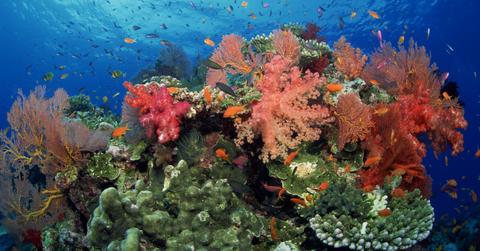Coral Reefs Are Essential to a Thriving Ecosystem — Here Are the Ways They Help
Jul. 25 2023, Updated 4:47 p.m. ET

Coral reefs are essential pieces of a balanced ecosystem. These gorgeous undersea cities are home to thousands of individual organisms, including creatures such as fish, crustaceans, corals, anemones, and microorganisms. Marine biologists and scientists continue to discover new species of thriving biodiversity in and around coral reefs yearly.
It isn’t just the underwater ecosystem, either — coral reefs form a necessary link in the chain of Earth’s ecosphere. But why are coral reefs so important to the ecosystem, anyway? Keep reading for all the details on the importance of coral reefs.

What are coral reefs?
According to the Coral Reefs Alliance, coral reefs are large underwater structures composed of the skeletons of colonial marine invertebrates. These invertebrates are known as coral. Some are hermatypic, or “hard” corals that extract calcium carbonate from seawater. The calcium extraction creates a durable exoskeleton that protects the corals’ soft, sac-like bodies.
Coral reefs also exist globally. The largest of all these reefs are found in shallow, tropical, and subtropical waters, and one of the very biggest of those — and the most endangered — is the Great Barrier Reef in Australia, which measures more than 1,500 miles long.

Why are coral reefs important to the ecosystem?
Coral reefs serve many roles within the marine ecosystem but are also crucial to how our global ecosystems work. Coral reefs protect coastlines from the damaging effects of waves and tropical storms.
Coral reefs also provide nutrient recycling, assist in carbon and nitrogen-fixing and water filtration, and provide nitrogen and essential nutrients for the diverse array of life within the marine food chain.
How do coral reefs affect wildlife?
Many animals call coral reefs home. The biodiversity in the reefs is unmatched anywhere else in the world, except for some rainforests. As habitats, coral reefs create a complex food web that goes from the sharks and dolphins at the top of the food chain to tiny sponges, invertebrates, and plankton at the bottom.
Eels, octopuses, clams, crabs, and clownfish rely on the reefs for protection. This vast array of creatures creates balance, and that balance eventually finds its way to the surface. It finds its way to our dinner tables, restaurants, boats, and boardrooms. Marine biodiversity is one of the main reasons that many seaside cultures keep going.

How do coral reefs fit into the food chain?
According to the EU Science Hub, baseline data in 2011 indicated that the global demand for seafood destined for human consumption is 143.8 million tons annually. Since then, the global population has risen to 7.8 billion people, with demand for seafood rising as well.
Fish and other marine life have been a source of food for nearly all of human history, leading to a rise in commercial fishing. With this, however, overfishing has become an economic and environmental problem for the marine world. Thankfully, there are solutions developing in the form of 3-D printed lab grown meat or vegan fish.
How do coral reefs protect our coasts?
Our coastal cities depend on coral reefs to buffer wave action and storm surges, according to Kuleana Coral Restoration. The Great Barrier Reef is aptly named because it provides a barrier against the destructive ocean forces that would have otherwise eroded the continent's coastline.
Coral reefs stabilize mangroves and seagrass beds, providing habitats, oxygen, and vegetation for inland species besides humans. In the Florida Keys, where the shore is lined with residential homes and commercial buildings, these reefs are a last line of defense against devastating tropical storms.

How do coral reefs help with water filtration?
According to Reef Relief, there is a reason that coral reefs don’t really exist in murky or polluted waters. Corals and sponges are often filter feeders, which consume particles from the water that surrounds them. This filtration then enhances the clarity and quality of the ocean’s waters. The problem is, the oceans today are much dirtier than they were when these simple organisms first evolved to perform this essential task.
Plastic, microplastics, toxins, and chemicals in our oceans are too much for the simple corals. They take in these toxins and exhale clean water, but the process corrupts their bodies as surely as it would our own. Without coral to filter and clean the water, our beaches and reefs will continue to succumb to pollution. Eventually, no creatures will be able to live in those waters.
How do coral reefs impact economies?
Coral reefs are usually part of national parks, and tourism accounts for a huge chunk of the economy in some places. Hawaii, Australia, Florida, and many other places rely on their beaches, reefs, and wildlife to draw in visitors and keep afloat. Pollution and coral damage has caused water to become murkier, beaches less hospitable, and many marine animals to become endangered. Without these things, coastal and island economies will falter, risking human lives and livelihoods.
Ultimately, coral reefs are important to the ecosystem because they are the pillars on which marine and coastal ecosystems are built. They keep plants, fish, and animals fed. The damage already done to these unique and essential biomes could signify a grim future for everyone.
This article, originally published on Dec. 23, 2020, has been updated.